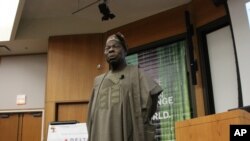Former Nigerian President Olusegun Obasanjo has expressed confidence that heads of state and government within the Economic Community of West African States (ECOWAS) are capable of resolving Mali’s crisis.
“What our leaders are doing I believe is right, so this day and age coups are no longer acceptable,” Obasanjo said in an interview with VOA. “But having said that, how do we now navigate getting those who in reality now have power by possessing guns and then move on to restore democracy. What our leaders should be saying is restoration of democracy, rather than restoration of any individual in power.”
Mr. Obasanjo delivered the keynote address on “Unlocking Africa’s Potential: Defining the Next Steps” at the Kellogg Africa Business Conference at Northwestern University Saturday, where he underscored the need for peace and security, stability, good governance and democracy.
Mali security concerns
Former President Obasanjo met with deposed Malian President Amadou Toumani Toure before his ouster by mutinous Malian soldiers.
Obasanjo said Mr. Toure had expressed his concerns following the resurgence of the Tuareg rebellion in January.
“We knew that at the end of the Libya operations, there would be fallouts. And the fallout would be where would all the weapons go? Where would be some of those who have been trained how to use weapons [and] how would they be accounted for? Obasanjo asked. “Part of what is happening in Mali is part of the fallout from Libya, and we should not expect that Mali will be the last.”
The Tuaregs are believed to have fought for long-time Libyan leader Moammar Gadhafi and then to have returned to Mali after his death.
Solving crisis
The former Nigerian leader outlined some steps West African regional leaders can take to help resolve the Malian crisis.
“We have to acknowledge the legitimate complaints of the military that they were given [a] task without adequate tools to perform the task,” said Obasanjo. “Our leaders should say, ‘well, we acknowledge this and having acknowledged that, we know that you are complaining about this legitimate situation that you find yourself [in], but the way you have gone about it is not the right way and that way is not acceptable.’”
Obasanjo said regional leaders should find some way to ensure those who have legitimate concerns are not unduly punished. He said ECOWAS should encourage the soldiers to return to their barracks, and “then some form of arrangement made to have a short transition period of a civilian administration that will conduct an election, and fully restore democracy and constitutional government.”




